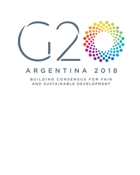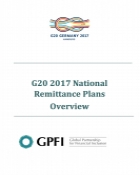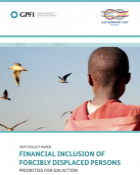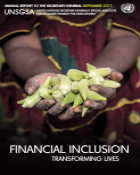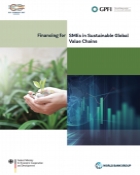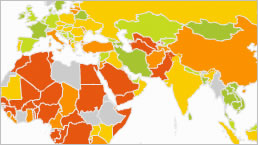Report | May 18, 2018
The Subgroup focuses on two action areas under the 2017 FIAP: (1) Improve the capacity of public authorities and other relevant stakeholders to develop, implement, and rigorously evaluate financial literacy and consumer protection initiatives and policies; (2) Promote consumer protection and financial education effective practices for financial products and services, including existing and emerging technologies, with emphasis on underserved and vulnerable groups.
Report | Apr 13, 2018
The Subgroup focuses on two action areas under the 2017 Financial Inclusion Action Plan (2017 FIAP) (detailed below): (1) mainstreaming financial inclusion in the work of SSBs and other relevant global bodies; and (2) encouragement of effective and consistent incorporation of financial inclusion in financial sector assessments.
Report | Apr 13, 2018
The SME Finance Subgroup focuses on improving SMEs access to finance both in G20 and non-G20 countries, including low-income developing countries. The Subgroup will continue to work in close collaboration with other GPFI Subgroups as well as the Temporary Steering Committee on Financial Inclusion for Forcibly Displaced Persons, and with other G20 groups, Implementing Partners and with non-G20 countries and the private sector, as appropriate. Further, the SME Finance Subgroup will continue to work on activities that have been started in 2017 and will start to work on the implementation of the updated 2017 G20 Financial Inclusion Action Plan.
Report | Apr 13, 2018
The Markets and Payment Systems Subgroup was formed in 2014 to work towards the achievement of G20 commitments on remittances, and inclusive digital payment systems. The Subgroup seeks to advance the utilization of inclusive payment systems, including remittances, in the pursuit of increased, responsible and sustainable financial inclusion.Over the coming years the Subgroup will focus its efforts on the continued implementation of the High Level Principles for Digital Financial Inclusion, supporting the G20’s commitment to the 2030 Agenda, including its target on remittances and focusing attention on improving the environment for remittances.
Report | Apr 12, 2018
The overall goal of the Subgroup is to advance utilization of payment systems, including remittances, in the pursuit of increased, responsible and sustainable financial inclusion. The Subgroup also promotes inclusive digital payment ecosystems, and focuses on emerging technologies and business models that will incorporate strong links to market based approaches through engagement with financial service providers. The Subgroup responds to the call in the G20’s St. Petersburg Development Outlook for the GPFI to explore “targeted actions to... harness emerging mechanisms such as electronic payments and mobile technology that can significantly improve access”. For the year ahead, the Subgroup will work on Action Areas 7, 8, and 9 as defined in the 2017 G20 Financial Inclusion Action Plan.
Report | Jan 29, 2018
This document highlights Argentina's priorities for the Global Partnership for Financial Inclusion and maps out key deliverables for the year ahead. Download Argentina's Priorities Paper here > >
Report | Nov 30, 2017
The G20 Leaders agreed to the G20 Plan to Facilitate Remittance Flows in 2014. Through this Plan they committed to implement national remittance plans outlining country-led actions supporting effective remittance flows and reducing remittance transfer costs. At the Antalya Summit in 2015, G20 leaders agreed that national remittances plans would be reviewed annually and updated every two years, with the first update to occur in 2017.Reinforcing this commitment to support effective remittance flows, this first update of the G20 National Remittance Plans encompasses the 2017 update of the GPFI Financial Inclusion Action Plan (FIAP), and includes key G20 commitments of recent years including:Alignment with the 2030 Agenda and Addis Ababa Action Agenda, including the target under Sustainable
Report | Feb 1, 2018
This Policy Paper is the result of an ongoing stakeholder dialogue and research effort launched under our German G20 Presidency, involving G20 and non-G20 countries, humanitarian and development organizations, private and financial sector actors, as well as NGOs and academia. It describes the potential of financial inclusion allowing FDPs to live up their (economic) potential and thereby contribute to host societies. It summarizes common challenges related to the financial inclusion of the vulnerable and very heterogeneous target group of FDPs in different contexts and stages of displacement.The Policy Paper calls on all stakeholders to engage in the implementation of the identified priority action areas toward enabling their financial inclusion:DIALOGUE AND COOPERATION: improve
Report | Nov 9, 2017
This annual report, published by the Honorary Patron of the GPFI, Queen Máxima of the Netherlands —UN Secretary-General's Special Advocate for Inclusive Finance for Development— lays out three priorities for action that could accelerate financial inclusion: ensuring development impact, promoting supportive policies for digital financial inclusion, and reaching neglected populations such as farmers, women, and small businesspeople.Financial inclusion is now firmly established as a powerful tool to improve lives and strengthen development. Great progress has been made. But with the Sustainable Development Goals on the horizon and inequality growing globally, the stakes are high.
Report | May 6, 2019
Increasing access to financing for small and medium enterprises (SMEs) has been a long-standing G20 priority under the GPFI. Strengthening SMEs in global value chains (GVCs) was highlighted as a G20 goal at the Hangzhou Summit in 2016, where G20 leaders reaffirmed their intention to support the development of SMEs and linkages to GVCs. Under its presidency in 2017, Germany has underscored the importance of SME finance in sustainable GVCs by further aligning this agenda with the G20’s Sustainability Development Goals (SDGs), and by emphasizing the need for companies to adhere to basic labor, social and environmental standards.This report demonstrates how governments, financial institutions and businesses can work together to support financing models that encourage SMEs to upgrade their



